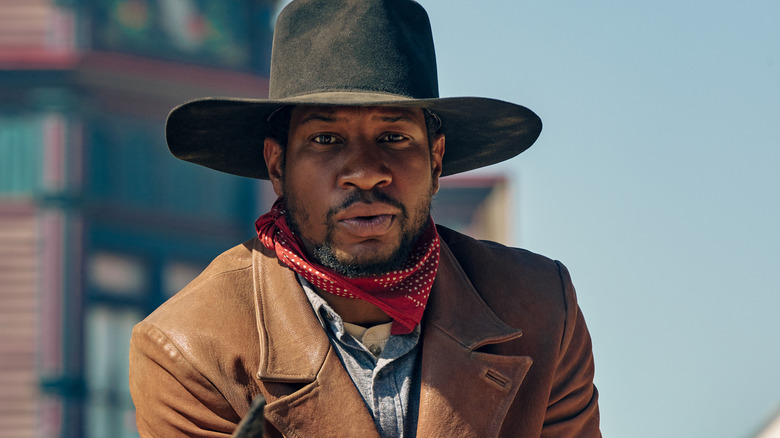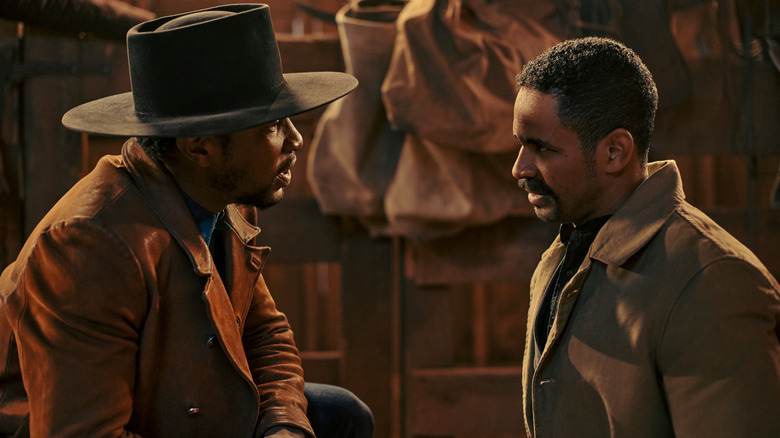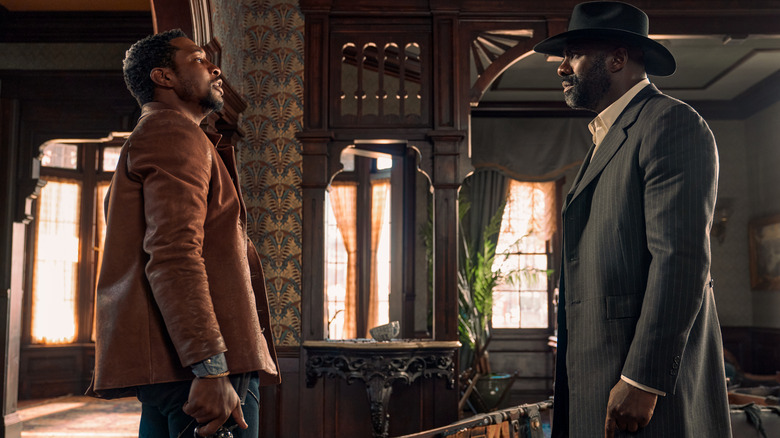The Harder They Fall Star Jonathan Majors Shares What He Learned By Playing His Character [Interview]
Jonathan Majors is a star on the rise. Since his 2019 breakout role in "The Last Man in San Francisco," he's been turning out memorable performances all over the place, stealing the spotlight in Spike Lee's "Da 5 Bloods," leading the way in "Lovecraft Country," and introducing a new villain to the Marvel Cinematic Universe as Kang the Conqueror in the upcoming movie "Ant-Man and the Wasp: Quantumania." But before he goes all cosmic supervillain, Majors dons a stetson and straps on cowboy boots for the stylish new western, "The Harder They Fall."
Majors plays Nat Love, an outlaw eyeing greener pastures until he learns that the man who murdered his parents has escaped from prison. Determined to hunt down his enemies and exact his revenge, Nat gets his gang back together and prepares for all out war. Ask and you may receive, because Nat ends up in a fight to the death against a very formidable rival gang. Though the outlaw holds a tough exterior and proves himself as a dangerous enemy, he still suffers from the pain of his childhood.
/Film spoke to Jonathan Majors about the many layers of Nat Love, sharing the screen with co-star Idris Elba and the lasting impact of "The Harder They Fall."
"It's the new guard. It's the avant-garde."
I know you and your castmates, and Jeymes have been calling this movie the New West, and I'd love to hear what that term means to you.
Wow, what does the New West mean? It's a bit of a metaphor, isn't it? It's an idea. It's a metaphor of things that are so fresh and new and wild and youthful, and it has the joy and the aggression and the surprising elements of something that is so undiscovered. And in two hours and 10 minutes, we drop you right into it, and there's still things that you haven't... I feel like there's still things we can explore within it. But the New West is, it's the new guard. It's the avant-garde of not just this genre, but of how cinema can maybe be made, I guess.
I've noticed the relationship between Blackness and masculinity... that comes up a lot in your work. And it's interesting to see it come into play with Nat, when we're so used to Western heroes suppressing their trauma, and he really wears it more on his sleeve. How were you thinking about those parts of him?
Oh, Blackness and masculinity. Well, I don't know if you noticed, but I'm Black. And I'm also male. So certain things I can't really shake, that just kind of comes with it. But, I guess what I was excited about, expressing with Nat is the whole gambit of the human experience to the best of my ability. Unfortunately those are the things, the containers that you're in, you can't shake, you can only stretch it and move it and express yourself within it in a way that hopefully transcends what it is to be X, Y, or Z. And so with that, the emotionality of him is natural. The aggression that he has is natural. The joy he has his natural because he fully experiences — this is a character that fully experiences life, whether he wants to or not. And I think the stoicism of a lot of the more, I guess, the trope of like the cowboy, of the outlaw and the stoicism of it is real and honest.
But I don't know if the stakes were ever that high for them. What we've done here in this film is the stakes are so high. What we're trying to do is so great. Because there's not just the initial violation that happens to Nat. There's that, and then there's the love that he has for Mary. And then there's the friendship and the loyalty that he has for Picket and Beckett, right? There's those elements of it. So he's too vulnerable. He's too open to close out. Because if he could do that, we wouldn't have the story. They wouldn't love him like that.
It's the fact that they see that. That allows them to attach, right. Which is why the cast is so vast and so strong in that way, because you have a character that is so full and so open that way, that multiple people, multiple events can connect to him. I don't think that's something we've seen in cinema, in the Western genre. And I know for a fact, we've not had a Black protagonist in this way. We just haven't had it...or antagonist to that degree.
"Where he goes bang, I go boom."
Speaking of your antagonist, you only have a couple of scenes, but you have these intense moments with Idris Elba. What was it like going head to head with that character?
Nat Love and Rufus Buck... It's a nightmare. It's a nightmare for Nat. [Rufus] is the boogeyman, he's the monster under the bed. I met this guy when he was... that's one of the most interesting parts about the psychology of Nat Love is that he meets his adversary, his nemesis, and he's a lot smaller. He's a boy. And this man comes in, right? That's terrifying. That's called arrested development. He will always be the Big Bad Wolf to Nat. And it's not that Nat grows up, it's that his courage grows and his rage grows that gives him the energy and the focus to go after him. He just has to do it. He has to do it. And the seed of that, the watering of that all comes from his love for his mother and his father.
So that's what we're filled up with in the scenes. And then you have a player like Idris Elba who's coming in and is using all his faculties to be present with you, to allow you to unload, and to also unload on you. Right. So then it becomes a matter of physics. Where he goes bang, I go, boom. He goes boom, I go bang. And then we're just building, building, building, building, building, building, building, and somebody shooting it. And there you are.
So it was a great deal of fun, to say the least, and also it's a very opening process on how to stay vulnerable in such a moment. Because you look at the two of us, Idris Elba and myself... I mean, it's 'Dris! It's 'Dris! Oh, man! But you see us transcend what folks think big muscular guys should do. You know what strong leads and a villain and a hero should do, right. We transcend that. We break that mold in that way, and expand it in such a beautiful way, I feel. And you can only do that if you've got somebody that's going to go there with you and that's going to push you and you can push just as hard. So that's what that's like.
Your character also exists in Jeymes' precursor film, "They Die By Dawn," played by the late Michael K. Did that version of the character inform your approach at all?
Actually, no. I watched it, and I watched it once, and then that was it. And I was watching for, because Michael and I internally share a great deal of similarities, but cinema is, you're photographing it. Right. And so we're different bodies. We're different men, different artists. So there was no way I was going to be able to do it. There was no way I was going to be able to do what Mike does. Nobody can, I can't do that. I can't do that. You know what I mean? I got to do it my way. I got to do it my way. So I was watching that film for kind of the relationship between Jeymes and the camera, and how he worked it out. But no, Mike's portrayal of his Nat Love, it's just so gorgeous. So gorgeous. And I think the thing we do share is just the heartache, the heartache that Nat carries, which is specific to Nat in the eyes, the way that heartache manifests itself in the eyes was something that I did notice in Michael's portrayal and agreed with that.
You've said that all of your characters teach you something. What do you think you're going to take away from being Nat Love?
Oh, wow. I mean, wow, what did Nat say to me? Nat's calm. Nat teaches calm and balance in a way. That's his whole thing that he's trying to get at, balance and fairness. Right. Keep keeping score, and trying to zero out. That's what Nat is all about. He's trying to zero out, he's trying to just get back to normal. And that's something to take from, for me, because I live in such extremes sometimes. You're out, you're pushing, you're pushing, you're pushing, but then somebody has to find a way to get back home. Right. You always come back home, is kind of what Nat, if I'd say anything, that'd be it. At least that's what it is right now.
"The Harder They Fall" is now playing in theaters and a arrives to Netflix on November 3, 2021.


